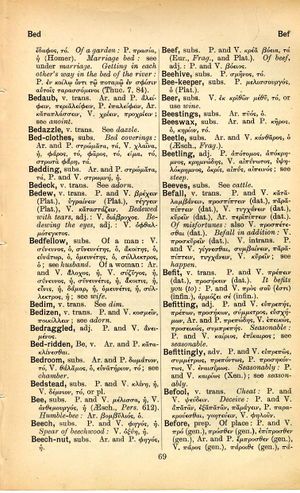bee: Difference between revisions
From LSJ
ἐν οἰκίᾳ τυφλῶν καὶ ὁ νυκτάλωψ ὀξυδερκής → even the day-blind is sharp-eyed in a blind house | among the blind, the one-eyed man is king
(D_1) |
(Gf-D_1) |
||
| Line 1: | Line 1: | ||
{{Woodhouse1 | {{Woodhouse1 | ||
|Text=[[File:woodhouse_69.jpg|thumb|link= | |Text=[[File:woodhouse_69.jpg|thumb | ||
|link={{filepath:woodhouse_69.jpg}}]]'''subs.''' | |||
P. and V. [[μέλισσα]], ἡ, V. [[ἀνθεμουργός]], ἡ (Aesch.. ''Pers.'' 612). | P. and V. [[μέλισσα]], ἡ, V. [[ἀνθεμουργός]], ἡ (Aesch.. ''Pers.'' 612). | ||
Revision as of 07:28, 14 August 2017
English > Greek (Woodhouse)
subs.
P. and V. μέλισσα, ἡ, V. ἀνθεμουργός, ἡ (Aesch.. Pers. 612).
Humble-bee: Ar. βομβυλιός, ὁ.
Latin > English (Lewis & Short)
bee:
I the sound made by a sheep, Varr. R. R. 2, 1, 7; cf. balo.
Latin > French (Gaffiot 2016)
bee, ind., onomatopée reproduisant le bêlement des moutons : Varro R. 2, 1, 7.

